 The story published the other day about residents complaining about the manure smell in southeast Amarillo reminded me of when I first arrived in Texas way back in 1984.
The story published the other day about residents complaining about the manure smell in southeast Amarillo reminded me of when I first arrived in Texas way back in 1984.
I moved to Beaumont, where the “smell of money” comprised cancer-causing agents being emitted from petrochemical plants throughout the Golden Triangle. We lived there for nearly 11 years, and got (more or less) used to the stench coming from the Mobil refinery near the Port of Beaumont. Those who live in the Triangle region of SE Texas have learned to live with the odor — even though the region has a relatively high rate of cancer-related deaths.
Before that, in my hometown of Portland, Ore., the money smell emanated from the huge paper mill across the Columbia River in Camas, Wash. That was the stench of sulphur used to process the wood into paper products. Given the importance of the wood-products industry in the Pacific Northwest, the odor meant that all was well with the economic lifeblood of that community. I’ve also wondered just how dangerous the sulphur is to the health of those who inhale it when the wind blows down along the Columbia River Gorge.
We moved here in early 1995. The smell of feedlots, particularly when the prevailing southwesterly winds were kicked up, wafted over Amarillo. I remember a local radio station slogan back then that said, “The Panhandle, where the winds of change blow in from Hereford.” It, too, is the smell of money. And its source is being used in all manner of ways, such as fertilizer for the turf farm in Randall County near where residents were complaining about the smell.
But I submit that this particular money smell is of a more organic nature. I am not aware of carcinogenic agents coming from manure.
I recall the stench sickening me one night shortly after I had arrived in Amarillo. But I got over it.
No, it’s not pleasant. But given the danger of certain other scents that drive communities’ economic engines, I’ve learned to live with this one.